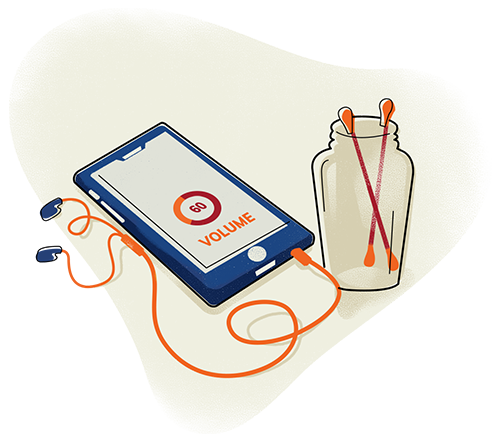Once your hearing capability is damaged, it can never be restored.

Your ears are one of the most sensitive and widely used organs of your body. They help you tune into life, literally! But unfortunately, any damage to your ears is irreversible.
Once you lose your hearing capability, there’s nothing that can be done to bring it back to its original state. Therefore, you need to take good care of your ears and maintain proper hearing health. Though a slight decline in it due to the advancing age is unavoidable, you can always safeguard yourself from the risk of any severe or permanent damage to your hearing capability.
In this article, we’ll discuss some useful tips following which you can protect your ears and your hearing health.
1. Avoid going to noisy places
Most cases of deafness are caused by prolonged exposure of your eardrums to a noisy environment. Too much noise can damage the tiny hair cells in the inner ear and hence, affect your ability to hear correctly. Therefore, you need to take adequate steps to prevent noise-related damage to your auditory system.
Avoid going to places where noise decibels are high. These may include factories, roadworks, construction areas, etc. In case you can’t avoid them (considering you work in any of these areas), make sure you’re wearing appropriate protective equipment to guard your ears. You can use earplugs or over-the-ear earmuffs that help in cancelling the effects of loud noises on your eardrums.
2. Practice good ear hygiene
Our ears produce a substance called cerumen or ear wax which helps in their lubrication and protection. However, too much of earwax can feel like a blockage against the eardrum and can even get mixed with foreign substances and cause infections. Therefore, you must clean your ears regularly, at least once a week.
Wash your outer ear with a clean cloth and use ear-cleaning buds to remove the excess wax. Never use any pointed object to clean your ears as they can do more harm than good.
3. Listen to music at low volumes
According to the World Health Organisation (WHO), almost 1.1 billion people worldwide are at risk of permanent hearing loss, owing to unsafe usage of audio devices. If you’re someone who enjoys listening to music or watching videos over multimedia devices, do it at a low volume.
You can follow 60/60 rule which says that while listening to music, you should keep the volume of your multimedia device at no more than 60% and use them for no longer than 60 minutes a day. Also, try to limit the use of earbuds as much as possible. Since they fit directly next to the eardrums, their prolonged usage can be hazardous for your hearing system.
4. Give adequate recovery time to your ears
When you’re exposed to loud noise or music for a prolonged period (for instance, at a bar, concert, or rally), it’s prudent to give yourself and your ears some time to recover after that. Step outside the place or switch to a site that’s quiet for at least five minutes, and let your ears rest after the excessive workout.
In fact, as per the researchers, our ears need an average time of 16 hours in a quiet environment to recover fully from a noisy night out.
5. Exercise daily
Regular exercising is not only good for your physical health but boosts your hearing health as well. Physical exercises such as walking, running, and cycling help in proper blood circulation to all parts of your body, including the ears. This ensures that the insides of your ears stay healthy and work to their maximum potential.
Also, practising yoga and meditation regularly helps in improving the nerve functions of your body and subsequently, sharpens your hearing skills.
In case you feel any difficulty in hearing or experience pain in your ears, you should immediately consult an otolaryngologists or ENT (Ear, Nose, Throat) physician. You should also consider having regular hearing check-ups to ensure that everything is fine.
Also, a comprehensive health insurance plan can help you get the best medical advice and prevent you from incurring any unnecessary expenses if and when you visit a doctor.